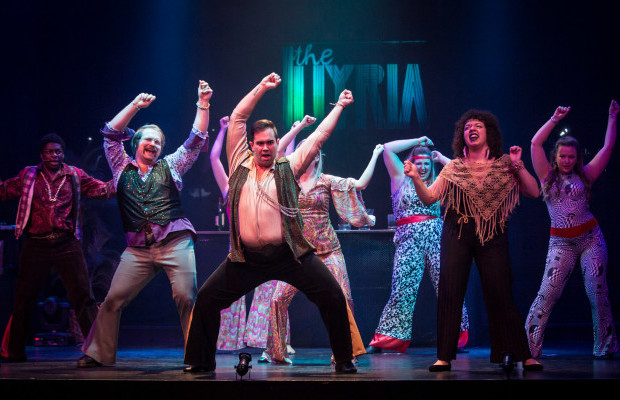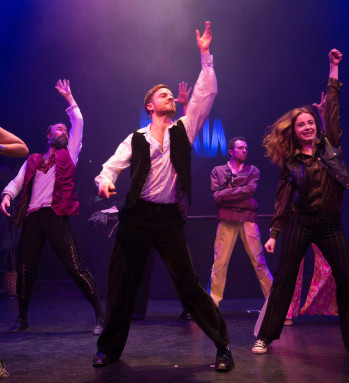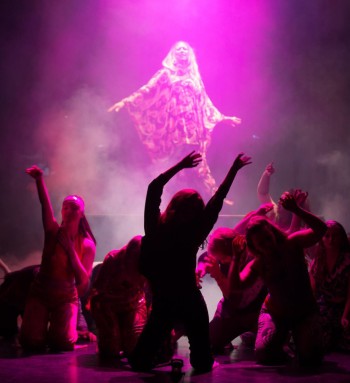
Disco still sucks, for the record. Any attempt to defend it as solely “dance music” will have to account for the genius of Winston “Scotty” Fitzgerald and Benny Goodman as just “dance music”.
That said, yes, go to Disco Nights, the impossible to dislike disco musical comedy performing to sold out audiences at Sydney’s Highland Arts Theatre this week.
Like two previous HAT productions, Dream: A 1950’s Midsummer Musical and its sequel Holiday on Christmas Island, writer/director Wesley J. Colford very cleverly updates one of Shakespeare’s comedies (in this case, Twelfth Night) and gives it a pop culture period twist.
So we are back in time when flared pants, platform shoes, and sequined everything happily roamed the earth waiting for the meteorite that was punk rock to arrive and cleanse the planet.
Specifically, we are in “The Illyria”, the hottest spot in town and the love of Viola (Lesley MacLean) who likes the night life and loves to boogie even though technically she’s three months two young to be allowed in. Her brother, Seb (Rory Andrews), is a club denizen trying haplessly to connect with the ladies (and Andrews has in previous HAT productions secured the exclusive patent on hapless male braggadocio).

What to do? Vi opts for the obvious plan of disguising herself as a male to bring the couple back together.
Meanwhile, Seb disguises himself as a female to gain access to Lady Liv after a highly romantic twirl on the floor.
Both are aided and abetted by various hangers-on and “courtiers” including the always on comedic target Andrew Gouthro as “Malvolio”, Geoffrey Lee-Dadswell as DJ Feste (in a droll Russian accent and gracefully athletic dance performance), Kyle Hunter as “Angelo”, Chris Mkandawire as the much ignored “Fabian” (who comes through in the end), Robyn Lee Seale as “Maria”, and Wesley J. Colford as the disco version of Sir Toby Belch (in a well-played smarmy performance).
They and their cast-mates deliver a uniformly energetic, delightfully committed, and impossible to dislike ensemble performance. The singing is more soulful at times than the originals, the dancing more lively than what I remember from the local product of that time, and the acting light of touch which makes the moments of sincere emotion between characters all the more engaging.
Shakespeare, no matter how he is transmogrified, can always take care of himself; in fact, when the actors speak some of his lines from the source material, a purity of poetic truth comes into this production that is probably why Colford, as adapter, placed them there.
For all the dead-on skewers of Seventies’ sexism among the heterosexual dominant culture (Lordie, with Trump in the White House does that mean we face a revival of disco too? Come on, meteor!), there is hardly a mention of some of the cultures (gay, African-American, Hispanic, and others) that nurtured pre-mainstream disco music. Maybe that’s too much to ask of a brilliantly-staged dance extravaganza that had its audience in the palm of its hand. But that cultural history to me has always been disco’s saving grace as a musical genre; before John Travolta donned his white suit and seriously interfered with my college beer-drinking nights, disco gave a voice to a range of marginalized communities.
Okay, the show includes one Village People tune, but not my favourite (a secret I will take to my grave).
Every aspect of this production was creatively conceived and executed from Cynthia Vokey’s showcase choreography, to Chuck Homewood’s musical direction (with musical arrangements by Stephen Muise), to Ken Heaton’s evocative lighting design, to the colourfully executed costumes by Diana MacKinnon-Furlong (and honestly some of the fashions of the disco era need to be executed), to the invisible, but essential work of sound technician, Ohan Vandermeer, and stage manager, the irreplaceable Mary-Jean Doyle and her assistant stage manager, Rachael Murphy.
Each of the HAT’s period dance comedies get better and more on target and layered, so director/writer Colford earns full marks for creating this love letter of happiness to the HAT’s loyal audience. It is one definite example of why some level (any level) of government (any government: Hey, Comrade Putin, you like the nightlife? You like to boogie, right?) should be supporting this venue. In four short years, the HAT has produced forty-five main stage productions for an audience that probably has not gone to the movie theatre that many times in the same amount of time.
Because there are only a handful of seats remaining for its announced run, the HAT has added two extra performances for Tuesday, March 20, and Wednesday, March 21, 8 pm nightly.
In summary, Disco Nights is a fun, energetic, irresistible musical comedy that should please everyone delivered by an incomprehensibly-talented cast with every disco ball polished to perfection and every spangle guaranteed to shine.
And, for the record (vinyl and otherwise), disco still sucks.

